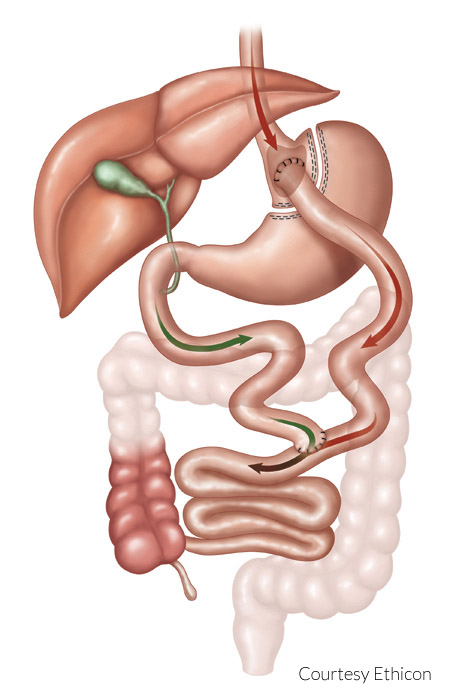Gastric Bypass Surgery Las Vegas

The gastric bypass is a combination of restriction and malabsorption. The amount of food a patient consumes is restricted by the reduced size of the stomach and the absorption of calories is lessened by bypassing part of the intestinal tract. The first phase of surgery involves cutting away approximately 85% of the existing stomach. The remaining usable stomach pouch is about the size of a golf ball. The larger part of the stomach remains in the abdomen, receiving no food, but contributing digestive juices further down digestive tract.
The second part of the procedure bypasses a portion of the small intestine, reducing the amount of intestinal surface area exposed to food and limiting caloric absorption.
As with most bariatric surgery procedures today including the gastric sleeve or sleeve gastrectomy, the gastric bypass is performed in a minimally invasive manner using four or five small incisions in the abdomen versus traditional open surgery that employs a large single incision. The procedure can also be performed with the assistance of our surgical robot. Procedures are typically performed in a hospital setting and require an overnight stay.
Results of the Gastric Bypass
As mentioned above, the gastric bypass was considered the gold standard in bariatric surgery because of the exceptional weight loss and disease resolution potential it offers. Of course, these benefits are only fully realized when patients stick to their diet and exercise regimen after surgery, so results will vary. However, patients can expect to lose between 65 and 80% of their excess bodyweight. Most impressively, gastric bypass patients are able to improve or eliminate many of the diseases associated with obesity very soon after surgery. This is particularly true of type 2 diabetes, which often goes into remission days after surgery and acid reflux which is resolved in the majority of patients.
Advantages of the Gastric Bypass
The gastric bypass holds its main advantage in the degree of potential weight loss and obesity related disease improvement. While the gastric sleeve is considered comparable in long-term weight loss, the gastric bypass is often the best option for people with uncontrolled type II diabetes as well as poorly controlled acid reflux.
Because the procedure is performed in a laparoscopic manner, pain, potential blood loss and risk of infection is significantly reduced versus open surgery. The risks of incisional hernias are reduced as well. The amount of time in the hospital and overall recovery is minimized when compared to open surgery.
Risks of the Gastric Bypass
As with any major surgical procedure, there are inherent risks of surgery, which can include a reaction to general anesthesia, blood loss, pain, infection and in very rare cases, death. There are also risks associated with any abdominal procedure, which can include the injury to nearby organs during surgery, hernias and more.
The risks of the gastric bypass in particular can include, although rarely, leaks from the staple line which require a corrective surgical procedure. Longer term patients who do not follow their post-operative diet risk stretching the stomach pouch and regaining weight. In some circumstances, a revision surgery may be appropriate.
Because of the malabsorptive component of the procedure, most patients will need to be mindful of vitamin and mineral deficiencies. In particular, vitamin D, vitamin B12, iron, calcium. All patients will require a multivitamin daily for the rest of their lives and blood will be drawn periodically at aftercare appointments to ensure no significant deficiencies.
Gastric bypass patients may also experience rapid gastric emptying, known as dumping syndrome after their procedure, especially when they consume high-fat or high sugar foods; or if they drink during a meal. The symptoms of dumping syndrome are similar to that of hypoglycemia or low blood sugar. They are uncomfortable but almost never dangerous. While this is certainly a consideration after surgery, it is also an advantage of the bypass. Dumping syndrome becomes a self-limiting factor after surgery. Patients quickly understand what causes them to dump, therefore avoiding these foods and behaviors in the future.
While the gastric bypass does have greater risks and considerations when compared to purely restrictive procedures, it can be very useful for patients suffering from uncontrolled type II diabetes or poorly controlled acid reflux. Most gastric bypass patients are able to adapt to their new lifestyle very soon after surgery and find they are able to maintain their weight loss over the long-term.
Contact us for more information about the gastric bypass procedure.



